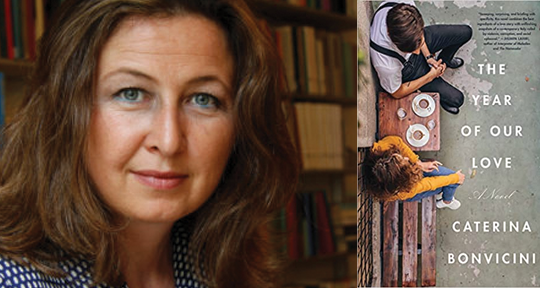The Year of Our Love by Caterina Bonvicini, translated from the Italian by Antony Shugaar, Other Press, 2021
“Life is a combination of magic and pasta,” the celebrated Italian filmmaker Federico Fellini once observed, and who can know this better than the boot-shaped Repubblica famous for an inimitable cuisine that has influenced the course of humanity? It doesn’t come as a surprise that The Year of Our Love was at least partly inspired, as explained in the author’s note, by a local osteria (a simple or inexpensive restaurant) and tales told over aromatic wine and a hot bowl of spaghetti.
Born in the picturesque city of Florence in 1974, the writer Caterina Bonvicini holds a degree in modern literature from the University of Bologna and has written more than ten novels, some of which have won prestigious prizes, among them Premio Frignano in Italy and the Grand Prix de l’Héroïne Madame Figaro in France. Critics often highlight the way her texts expose the bourgeois lifestyle, while placing women, with their conflicting worldviews, internal dilemmas, and well-hidden feelings, at the center of the story.
The facts of her life reveal similarities between Bonvicini and the novel’s protagonists. The journey starts in 1979, only five years after she was born, at the height of the so-called Years of Lead, when Italy is locked in the firm grip of warring right- and left-wing factions. The first pages are filled with markers of the recent past: terrorist attacks, including the infamous Italicus Express bombing; numerous brigades and gangs; brutal kidnappings. Immersed in a world of turbulent clashes and savage confrontations, we meet Valerio Carnevale and Olivia Morganti—raised together even though their families are separated by a social divide that could hardly be bridged under ordinary circumstances. The passing seasons of childhood in the Emilia-Romagna region, home to the picturesque Bologna and the place where Valerio eventually studies to become a magistrate, overflow with stories about guns, hiding places, and bodyguards, exquisitely recounted by the girl’s grandmother, Manon, whose notions about beauty and truth exert a great influence on the children. But after Valerio’s mother begins an affair with a handsome swindler, the family is forced to move to one of Rome’s least prestigious neighborhoods, and the interaction between the two changes profoundly. Finally, it comes to a halt. READ MORE…



